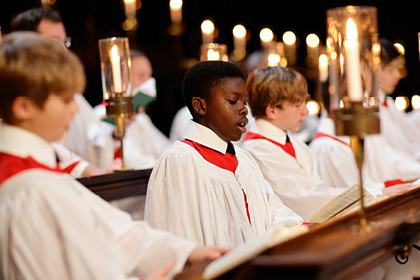Glance at Daniel Hyde’s biography, and you’re struck by the singular focus.
Chorister, organ scholar, choral director: his life since childhood has been spent in and around churches and choirs. ‘I couldn’t ever imagine doing anything else,’ he muses. And yet it all started through family loss.
His father died when he was four, leaving his mother with the challenge of looking after four children under the age of nine. ‘A friend of hers made an off-the-cuff remark about both boys being musical, and whether she’d thought about choristership. I got a place at Durham and accepted it; the next day George Guest phoned my mother and offered me a place at St John’s, Cambridge, which she had to turn down.’ The Cambridge colleges of St John’s and King’s, both with superlative choral traditions, are sworn rivals – perhaps one reason why Hyde doesn’t regret, or can’t admit to regretting, this sequence of events.
He credits his years in Durham Cathedral choir with giving him the musical toolkit that led to a music scholarship at secondary school, then to an organ scholarship at King’s. Professional positions followed in illustrious succession over 17 quick years: Jesus College, Cambridge, Magdalen College, Oxford, Saint Thomas Church, New York, and now King’s College, Cambridge. He wonders if some people might call his career trajectory ‘unimaginative’, a statement which says much about Hyde’s natural humility. Many would instead choose to describe it as ‘stratospheric’.
With his own childhood and life so shaped by being a chorister, Hyde is unsurprisingly an evangelist for the experience – for its musical benefits, but also for the life skills, forged at an early age, of working in close partnership with others, and being part of something ‘bigger than yourself’. This approach shapes his attitude towards his current role. ‘It’s not my choir,’ he insists. ‘It’s the college’s, and I’m the steward.’
Hyde’s first contact with Cambridge was unassuming, a stop-off on the way home from the airport after dropping off his sister’s German exchange. Already in love with singing but unprepared for the spectacle of the 16th-century chapel (what he now affectionately calls ‘a quite extraordinary studio to work in’), the 12-year-old turned to his mother and declared his intention to one day end up there. She pragmatically told him, ‘You’d better start doing some work.’
Quite how much work, he perhaps couldn’t imagine. If King’s was a long-held lodestar, he never realised how tough the Director of Music role would be. In a regular week there are 26 hours of rehearsals and services, all of them demanding Hyde’s full attention to motivate the choir and fine-tune its performances. (‘It’s like lifting up the bonnet, tinkering with the engine, constantly oiling and greasing so that the Rolls Royce runs smoothly.’) On top of that, his role demands that he is effectively a full-time manager. ‘It takes a lot out of me,’ he admits.
So what keeps him going? We might assume it’s the big-ticket items like the Festival of Nine Lessons and Carols on Christmas Eve, heard by millions worldwide. But instead Hyde’s voice glows with pride as he identifies less-fêted musical moments in regular Evensong services, when a chorister unexpectedly sings an extraordinary solo or nails a tricky line that they’ve been working hard to master. It is musical excellence that drives him, and his charges are the perfect accomplices. ‘With children, if you set the bar high, they will jump over it.’
This visit to Australia is the latest chapter in a long relationship. As a teenager, he sent a speculative letter to St George’s Cathedral in Perth when he was looking to fill his gap year. On the strength of a tape of his playing and without meeting him, he was hired as Assistant Organist. (Hyde is an organ virtuoso, but is content that his current commitments lean towards the more gregarious pursuit of conducting. ‘Being an organist can be an extremely lonely occupation. I just like being around other people.’)
In 2019, appointed to the role at King’s but yet to start, he was parachuted in to replace then-director Stephen Cleobury on the choir’s previous Musica Viva Australia project. It had been planned to be the last overseas tour in Cleobury’s 37-year tenure; he died just months later, and remains a huge influence on Hyde.
If Hyde’s last antipodean visit was a test drive, then he is now firmly in the driving seat of this well-tuned Rolls Royce, and curious as to how Australian audiences will perceive any change to the choir’s sound. When pressed on what distinguishes his tenure, he talks about his focus on musical shape and phrasing: ‘You never just sing the notes,’ he says simply, and he reminds us that text always existed before music. Once the phrasing is in place, and only then, he gets to work on the more technical aspects of tuning and blending. But the tour isn’t just about giving superlative performances: from a range of excursions for the choristers and scholars, to commissioning a new Australian work, he is adamant that the exchange must be in both directions. ‘We hope to add culturally to Australia, but we need to learn from Australian culture while we’re there.’
In an age when ‘being elite’ and ‘elitism’ are often conflated, Hyde is ultimately unabashed about his pursuit of excellence, and the impact that it can have on its audiences.
‘I don’t know who has come and for what reason: because they are over the moon or because someone in their family has just died. The music has to be as good as we can possibly make it, because that will speak to people in different ways. We will never know what they take from it, but the power of that is off the scale.’


